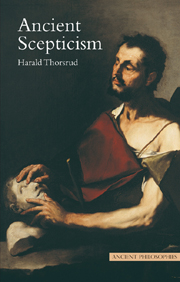Book contents
- Frontmatter
- Contents
- Preface
- Sources and abbreviations
- Chronology
- 1 Introduction
- 2 Pyrrho and Timon: the origin of Pyrrhonian Scepticism
- 3 Arcesilaus: the origin of Academic Scepticism
- 4 Carneades
- 5 Cicero: the end of the sceptical Academy
- 6 Aenesidemus: the Pyrrhonian revival
- 7 Sextus Empiricus: the consistency of Pyrrhonian Scepticism
- 8 Pyrrhonian arguments
- 9 The (ordinary) life of a Pyrrhonist
- Notes
- Guide to further reading
- References
- Index of passages
- Index
6 - Aenesidemus: the Pyrrhonian revival
- Frontmatter
- Contents
- Preface
- Sources and abbreviations
- Chronology
- 1 Introduction
- 2 Pyrrho and Timon: the origin of Pyrrhonian Scepticism
- 3 Arcesilaus: the origin of Academic Scepticism
- 4 Carneades
- 5 Cicero: the end of the sceptical Academy
- 6 Aenesidemus: the Pyrrhonian revival
- 7 Sextus Empiricus: the consistency of Pyrrhonian Scepticism
- 8 Pyrrhonian arguments
- 9 The (ordinary) life of a Pyrrhonist
- Notes
- Guide to further reading
- References
- Index of passages
- Index
Summary
What I have described as progress in the last chapter was seen as decline by at least one member of the late Academy. Aenesidemus criticized his fellow Academics for being dogmatic. The long dispute with the Stoics had effectively come to an end, and the Stoics had won. The Academics had completely abandoned their originally strict stance on epochē and now made firm determinations about a whole range of philosophical issues.
Aenesidemus committed his scepticism to writing, probably some time in the early-to-mid first century bce. Unfortunately, only some fragments and testimonia survive. The most extensive reports are about his Pyrrhonist Discourses. One of these comes from the ninth-century Byzantine patriarch Photius, who is remarkable in his own right. In his Bibliothēkē, Photius summarizes 280 books, including the Pyrrhonist Discourses. It is clear from his summary that he thinks very little of Aenesidemus' work because it makes no contribution to Christian dogma and drives from our minds the instinctive tenets of faith (Bib. 170b39–40). Nevertheless, Photius is a generally reliable source (Wilson 1994). So despite his assessment of Aenesidemus' scepticism, he probably provides an accurate summary.
The proper interpretation of that summary, however, along with the general character of Aenesidemus' Pyrrhonism, is disputed. The central issue is whether the revived Pyrrhonism is a type of relativism that affirms the impossibility of knowledge, or whether it is more consistent with Sextus Empiricus' later scepticism, according to which we cannot conclusively rule out the possibility of any kind of knowledge.
- Type
- Chapter
- Information
- Ancient Scepticism , pp. 102 - 122Publisher: Acumen PublishingPrint publication year: 2008

